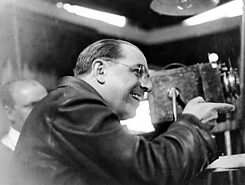German Cinema in Focus
We invite you to
Comradship (1931), directed by
G.W. Pabst. This is the
11th screening in our ongoing film series
German Cinema in Focus curated by
Shivani.
Comeradship is the third of four films in the sub-section
Directors Special, spotlighting
G.W. Pabst, one of the masters of early German Cinema.
Based on one of the most devastating industrial incidents in history, the Courrières mine disaster of 1906 in France, the film portrays the challenges faced during rescue operations following a coal dust explosion. The narrative unfolds in a mine previously divided between France and Germany by the Treaty of Versailles, in the Lorraine–Saar regions of the French-German border. It depicts a mining catastrophe in which German miners undertake the heroic rescue of Frenchmen amidst an underground fire and explosion. Workers from both nations work together putting aside prejudices and wartime grudges for a common cause.
Along with Westfront 1918, this starkly realistic film serves as another compelling plea for pacifism during the final years of the Weimar Republic.
Comradship
by
Georg Wilhelm Pabst
1931 | b&w | 93 min.| German with English subtitles
 © CINEMA-AUSTRIACO
Georg Wilhelm Pabst
© CINEMA-AUSTRIACO
Georg Wilhelm Pabst was an Austrian film director who went on to become a very influential German-Language filmmaker. His cinematic works are distinguished by their profound exploration of the human psyche and the depiction of individuals grappling with societal, cultural, and political challenges. His expertise in film editing is also noteworthy, with pioneering contributions such as continuity editing, the utilization of motivated point-of-view shots like the eyeline match, and the shot-reverse-shot technique for constructing dialogues. Furthermore, he enhanced the art of editing during sequences involving dynamic motion.
His films from the late 1920s and 1930s, contain a strong emphasis on the interrelationship between social conditions and the individual delving into how regular people grapple with the political turbulence, economic crises, and ethical decay that collectively contributed to the destabilization of the Weimar Republic. Some of his iconic films include Joyless Street (1925), Secrets of a Soul (1926), Pandora’s Box (1929), Diary of a Lost Girl (1929).
During the early 1930s, he transitioned into creating politically left-leaning films, including notable works like Westfront 1918 (1930), The Threepenny Opera (1931), and Comradeship (1931). However, this phase was short-lived because he was forced to cooperate with the Third Reich in producing propaganda films, which negatively impacted his career. Following the conclusion of the war, Pabst relocated to Vienna and directed films that strongly condemned anti-Semitism that helped restore his reputation. He died in 1967.
Back